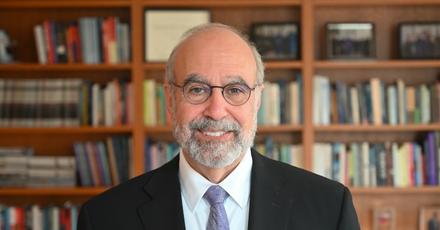
Daniel L. Goroff
Vice President
Program Director
-
Daniel Goroff serves as Vice President and Program Director at the Alfred P. Sloan Foundation, a grantmaking philanthropy that supports breakthroughs in science, technology, and economics. He is a particularly passionate patron of rigorous and policy-relevant research in the social sciences, while also running the Sloan Research Fellowship Program that funds promising junior faculty in a variety of disciplines.
During much of 2023, Goroff was on leave working as Deputy Director for Science and Society at the White House Office of Science and Technology Policy, reporting directly to the cabinet member who is the President’s Science Advisor. This was his third tour of duty at the White House. He has a continuing advisory role there and at NSF, where his previous title was Division Director for Social and Economic Sciences.
Daniel Goroff is Professor Emeritus of Mathematics and Economics at Harvey Mudd College in Claremont, where he also served as Dean of the Faculty and Vice President for Academic Affairs. During twenty years before that at Harvard University, he rose in rank from Assistant Professor of Mathematics to Professor of the Practice and Associate Director of the Derek Bok Center for Teaching and Learning. A winner of the Phi Beta Kappa Award—the highest recognition for educational excellence in Harvard’s Faculty of Arts and Science—Goroff not only developed and taught courses in mathematics, but also in economics, physics, engineering, and history of science, as well as a pioneering course on “Decisions, Games, and Negotiations” that was popular online, too. The Masters Program he founded and directed at Harvard on “Mathematics for Teaching” still enroll several dozen degree candidates each year.
Goroff’s research interests include decision-making under uncertainty, optimization over time, the mathematics of privacy, and the economics of science. He has held extended visiting positions at Bell Laboratories in New Jersey, the Institut des Hautes Études Scientifiques in Paris, the Mathematical Sciences Research Institute in Berkeley, the Dibner Institute at MIT, Columbia University’s Teachers College, and the Bellagio Residency Program for Academic Writing in Italy. Books he edited include one on Science and Engineering Careers with Richard Freeman as well as a three-volume translation, with an extended introduction, of Les Méthodes Nouvelles de la Mécanique Céleste by Henri Poincaré. Getting to the Point, a textbook on reasoning co-authored with Nat Kuhn, recently resumed classroom testing.
Goroff earned his B.A.-M.A. degree summa cum laude in Mathematics as a Borden Scholar at Harvard, an M.Phil. in Economics as a Churchill Scholar at Cambridge University, a Masters in Mathematical Finance as an HMC Scholar at Boston University, and a Ph.D. in Mathematics at Princeton University as a Danforth Fellow. He also completed an Executive Education Program for Nonprofit Leaders at Stanford’s Graduate School of Business in 2013. He was elected to the Faculty Council at Harvard in 1991, to the Board of Directors of the American Association for Higher Education in 1994, to the Board of Directors of the Global Legal Entity Identifier Foundation in 2016, and to the Board of Trustees of Smith College in 2016.
Daniel Goroff has presented Congressional testimony about science and economic policy before both the House and the Senate. A Fellow of the American Association for the Advancement of Science, he helped found the Science Philanthropy Alliance, the Research on Research Initiative, and the Societal Experts Action Network. He is a tireless advocate for research rigor and reproducibility, for evidence-based policymaking, and for accountable institutional innovation—especially concerning diversity and inclusiveness. For his support of research on data science and economic measurement, Goroff won the 2020 Links Lecture Award presented by the American Statistical Association. In 2023, he also won the Leadership Award of the International Conference on the Science of Science and Innovation.
-
- Contact goroff(at)sloan(dot)org
- Links
-
Staff
- Program Coordinator [email protected]
- Program Associate [email protected]
- Program
- Subprogram